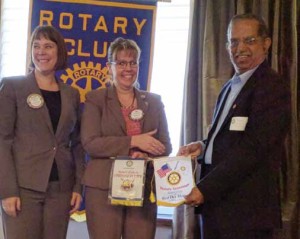Terry Snyder has been running her photography business in Waukee for 23 years. She doesn’t have a large staff or a substantial marketing budget. Although she does some advertising, she relies a great deal on business networking, attending events and asking for referrals, and she is not alone.
Snyder is a member of the Waukee Chamber of Commerce and sees great value in the relationships she has built as part of the organization. She has also reached out to other networking groups through the years. Today she is heavily involved in a newer networking organization called Metro Business Friends, which meets each Thursday morning.
“I keep it to just a few groups now,” she says. “I helped Dave Milburn start this group a few years ago because we wanted a wider area to cover, open to anyone in the metro, with no costs to belong and no mandatory rules.”
Each business and its needs are unique, and that is why business owners in the western suburbs are fortunate to have a variety of business networking groups to choose from. Even so, most business people agree that making connections and building professional relationships are vital aspects in developing their business and helping it grow.
It’s also advice that is often ignored, or a step that business owners are hesitant to take because they don’t know where to start.
Networking is effective because people prefer to do business with people they know or were referred to, according to Business 2 Community, a business blog that provides leadership advice along with business/organization exposure and networking opportunities.
Joining a networking group can greatly complement a business’ ability to get the word out about its goods and services. Combined with effective marketing, it can give a strong presence that puts a face with a name.
“Anything to do with a business anymore requires networking for the biggest reason that marketing is expensive,” says Trish Flaherty, membership manager for the West Des Moines Chamber of Commerce.
Of course, belonging to business networking groups can be expensive as well, especially if one considers time as money. Ideally, networking and proven marketing efforts work together to help a business truly succeed.
Here is a list of ideas to help you get started.
- Do your research and ask around for suggestions
Dozens of professional networking groups exist locally, from your community’s chamber of commerce to groups dedicated solely to businesswomen, or young professionals and service organizations. Take some time to learn about them and decide which ones are the best fit for you.
Some local organizations include:
Business Networking International

BNI is the world’s largest networking group with local chapters. The organization’s philosophy is that “Givers Gain,” meaning that, by giving business to others through word-of-mouth referrals, one will receive business in return, according to BNI’s website.
Locally, DM-Business First, a chapter of BNI, meets each Thursday at 7:30 a.m. at Glen Oaks Country Club in West Des Moines. The group is devoted to passing referrals on to each other because most of the 16 members are business owners or responsible for driving their own sales and income, says Ariane Criger, a graphic designer who joined in 2013 and serves as its president.
“For me, it’s been a huge thing,” she says. “I work for myself. I don’t have other employees or a sales team out there promoting me. (Through BNI) I have more people out there helping me look for business.”
At each meeting, members — who range from lawn maintenance and landscaping professionals to mortgage brokers and bankers — speak about the business they are seeking and with whom they’d like to make connections. In addition, one member gives a presentation about his or her business in order to familiarize the group with that person to better assist with referrals. Members receive an initial training to learn how to become a successful networker and get the most out of their membership, Criger says.
Chambers of Commerce
Waukee and West Des Moines both have chambers of commerce that help business owners market themselves, learn more about growing their business and create relationships and connections, chamber officials say.

Flaherty says West Des Moines’ bigger businesses want resources that provide education, while smaller businesses want networking opportunities to meet more professionals. The chamber offers roundtable panel discussions on topics that are relevant to all businesses, and speakers discuss a wide range of areas, some of which are not related to business, she says.
West Des Moines’ chamber is one of the largest in the state and serves more than 600 members. The most recent panel was about federal laws regarding overtime rules.
“We are putting together a panel of attorneys and legislators who are going to come in and talk about those laws and how they’re going to affect your business,” Flaherty says.
Other topics have included a seminar on web applications designed to help businesses expand sales, and how to ensure a business is found and displayed during online searches.
Chamber events include breakfast and after-hours social events held at members’ businesses. Accelerate is a group specific to young professionals. Elevate, the women’s group, also draws businessmen, depending upon the invited speaker.
In addition to events, chambers work to help members promote and publicize their business through referrals, directory listings, website and newsletter advertising, job postings on the chamber website, sponsorship opportunities and more.

Jaime Niblo, a realtor and broker for Chayse Holdings LLC, joined the Clive, Waukee and West Des Moines chambers to help market her company, which formed this year.
“We want to get active in the community while also trying to network and expose Chayse Holdings a little more,” she says.
Networking opportunities are crucial for real estate because “you never know who’s looking,” Niblo says.
The Waukee chamber has 290 business, organization and individual members. Membership “will help you connect to more of the people you want to do business with,” says Melinda Behn, executive director of the Waukee Area Chamber of Commerce.
Members can share business information such as job postings and upcoming events in the Waukee Chamber Monday Business Report, which is emailed to businesses and community members. The chamber also hosts events to highlight businesses’ services and monthly networking opportunities, provides referrals for member businesses and event sponsorship opportunities, and offers ribbon cutting ceremonies.
Each month the Waukee chamber hosts a networking luncheon for members to introduce their business and development relationships with other members.
Women’s group
In West Des Moines, the American Business Women’s Association has a chapter to bring together women of various occupations through leadership, networking, education and support so they can grow and help each other.
The Chocolate Connection Networking Women’s Group is a unique professional group for central Iowa. It has more than 500 female members, and attendees pay $8 for most events they attend. Events are hosted at locations that are important to women such Dress For Success and a recent vendor fair, where women shared information about their businesses. Usually 35 to 40 women attend from those who are starting their careers to retirees.
“It gives them an opportunity to meet other businesswomen in a casual environment,” says Joan Ellis, who organizes the group.
Central Iowa Business Group
The Central Iowa Business Group is referral-based networking group that meets weekly. The 20 members are professionals and tradespeople who want to grow their businesses within central Iowa. Only one person from each professional specialty is able to join the group.
The group meets at 7 a.m. Tuesdays at the Iowa Machine Shed, 11151 Hickman Road in Urbandale.
- Don’t forget about small merchant and non-business organizations
For those who like to volunteer, there are nonprofit groups that often draw business-minded professionals, including local Kiwanis, Optimists and Rotary International clubs.
“It’s fun to be able to give back to the community, but it’s fun to meet other professionals and to meet other people,” says Amy Fetters, president of West Des Moines’ Rotary chapter, which has 62 members.

Both Waukee and West Des Moines have their own Rotary chapters. The chapters focus on service events, where members are able to connect with each other. There’s also lunchtime workshops that feature speakers who may speak about nonprofit groups or provide business development advice. Members — whose daily professions include work in finance, education, construction and more — can use this event to network and meet with others, Fetters says.
“There are connections being made all of the time because some members know different things,” she explains. “This is where some people know you’re in a certain profession, and they might ask you specific questions on something that has to do with your profession that they’re working through.”
West Des Moines and Waukee also have their own smaller merchant communities. The Historic Valley Junction Foundation is free for business owners to join. The foundation hosts meetings to assist merchants and address issues within the Valley Junction business district. It also hosts events for the area and helps businesses market themselves. The Waukee Triangle Businesses group hosts a website with businesses listings and advertises events that take place in the historic district.
- Utilize social media, online networking sites

From online discussion forums to business social media sites, the Internet can offer resources to small business owners and new entrepreneurs that can be less expensive or free.
Social media sites such as Facebook and LinkedIn give business owners the opportunity to connect with others through the creation of a profile, events and other connections that include the formation of groups where information is exchanged and shared. Small Biz Nation, a group on LinkedIn, gives advice to small business owners from across the world and helps them make connections and receive insight from experts. Locally, LinkedIn members can search for local groups connected to West Des Moines and Waukee or their area of profession, or create their own LinkedIn group.
Other online sites such as Meetup and Eventbrite allow users to search in their area for events that may be connected to their business.
- Look for ways to support your business
In addition to networking groups, business development centers can help entrepreneurs and give them advice on how to create professional connections.
The U.S. Small Business Administration exists to help the more than 28 million small businesses within the country, and there’s an office in each state. Some of the administration’s programs help newer business owners connect with more experienced ones through online support groups. Business owners also can receive free consulting services and training programs at a reduced cost.
Iowa’s Small Business Development Center helps business owners write plans, conduct market research, learn budgeting information and write a business plan through free, confidential, customized and professional services.
The West Des Moines Business Incubator Networking Group assists both new and veteran business owners. The incubator itself is a building at 318 Fifth St. in Valley Junction where business owners can establish a professional pre-furnished office space for a month-by-month rent of $400 to $500 a month, plus insurance.
In addition to the space, business owners receive access to an attorney and a certified public accountant for legal and tax questions, and counseling services and quarterly meetings, where they are introduced to a network of other professionals.
“We can get them in to talk to the CEO of a business within one phone call rather than the person trying to do it themselves,” says Jo Eckert, assistant executive director of the West Des Moines Business Incubator.

The incubator hosts several free networking groups for business owners:
The Business Incubator Networking Group (BING) meets at noon every Thursday for a Lunch ‘n’ Learn. About 30 people, from doctors to realtors to accountants, meet to discuss topics that include speed networking, marketing, business plans, what’s working and not working with individual businesses, and to share resources and leads. Afterward, the facility is open for “co-working,” and free wireless is available.
BING Sweat Equity takes places from 8 a.m. to noon on Saturdays. Attendees learn about business models and plans and help each other learn various aspects of business. Those who attend can network and brainstorm, work on business pitches and marketing ideas, get help with their website and more.
“People come and go and take advantage of it as they need,” Eckert says.
Startup Sisters meets from 8 a.m. to noon the second Saturday of each month. Eckert started this group with a couple of other women professionals who attended Drake University’s entrepreneurial boot camp. The workshop is designed for women and gives them opportunities to discuss their business, ask questions and receive feedback from other businesswomen.
- Get over your nerves and go
Public speaking and unfamiliar situations make most people nervous. Joining a networking group can help, and many networking groups are informal and sometimes discuss other topics in addition to business.
In Rotary for example, members develop confidence and public speaking skills and have an opportunity to work on general people skills through the various activities in which members participate.
Several of the West Des Moines Business Incubator groups also give attendees the opportunity to work on sales pitches and share information about their companies. Business owners are encouraged to bring a stack of business cards and give others who attend a reason to refer customers to their businesses.
If you’re still unsure about whether to attend a networking event or meeting, read the agenda or event description. Those that are heavy on icebreakers and other activities may not be for everyone. Business owners also can create their own networking groups based on interests.
- Take the time and
make the investment
Joining a networking group or attending professional events takes time and money and requires you to be an active participant to get the most out of every opportunity, business people and group organizers say. Simply showing up at networking events won’t make your business grow, but if done properly it will help make your face and your company more recognizable to hundreds of people in the local business community. When your photo shows up in publications like this one from attending networking events, you reach thousands more. That exposure is free, but there are varying costs to belong to many networking groups.
Some organizations have membership fees associated with them to pay for luncheons, speakers and for other operational expenses. Some have fancy offices and layers of staff to pay for. Others meet at coffee shops and rely mostly on volunteer efforts. Most all groups provide a list of services that members will receive with their membership fee or dues. Depending on what you utilize, this may be a great value for your business.
The Central Iowa Business Group requires members to attend at least 50 percent of meetings each year with the idea that attendance builds trust and networking opportunities. Members also are asked to give referrals to other members.
BNI members are asked to carry around fellow members’ business cards and pass them out when they find someone who could use the products or services. Last year, members gave 7.7 million referrals nationwide that generated $9.3 billion in business, according to the organization’s website. DM-Business First’s annual dues are $480.
Dues are $1,125 a year for West Des Moines Rotary. Part of that money goes toward national dues and a service foundation.
Area chambers of commerce also require annual dues for members, ranging from $50 for a personal membership to almost $650. The dues also cover membership into the Greater Des Moines Partnership and access to its events.
“Getting your name out there is important to any business, and networking is one of the most economical ways to do it,” says Snyder. “I have made a lot of new connections all over the metro. Although I would like more, I have gotten some new business and made connections on how to promote my business more. That’s what it’s all about.”


superbeets review
Does your blog have a contact page? I’m having problems locating it but, I’d like to shoot you an email. I’ve got some suggestions for your blog you might be interested in hearing. Either way, great website and I look forward to seeing it expand over time.|